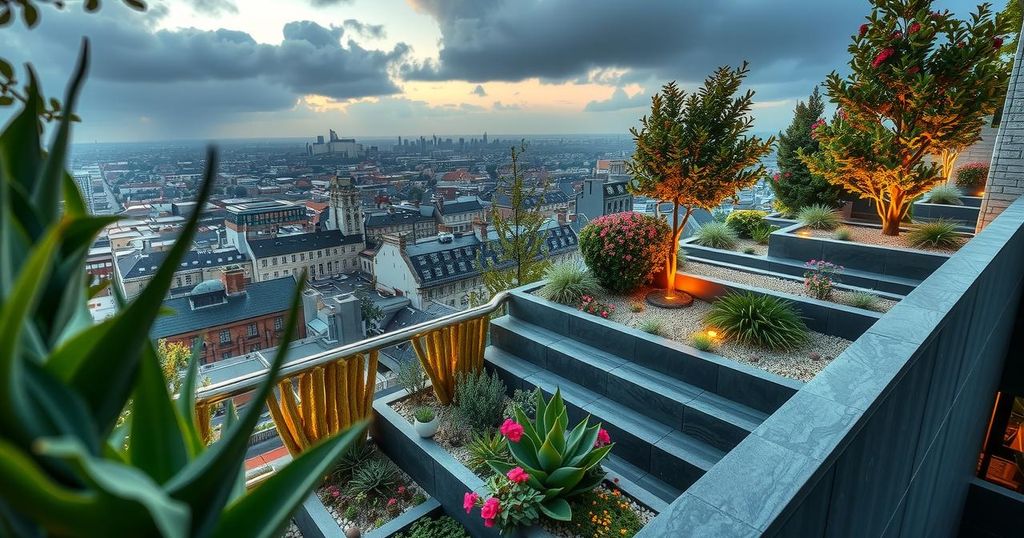The Centre for Science and Environment’s Climate India 2024 report reveals an urgent climate crisis in India, marked by extreme weather that has caused significant loss of life and agricultural damage. Urban areas, particularly vulnerable populations, face intense heat, necessitating adaptable solutions. Green initiatives, especially terrace and balcony gardens, have shown promise in mitigating these challenges, offering cooling effects and enhancing biodiversity. By adopting supportive policies, India can lead in utilizing green spaces as effective responses to climate challenges, transforming cities into healthier and more resilient environments.
The report from the Centre for Science and Environment’s Climate India 2024 sheds light on a pressing crisis: the country is grappling with extreme weather events almost daily, leading to the loss of more than 3,000 lives and damage to over 3.2 million hectares of farmland in just the first nine months of the year. These adverse conditions have impacted nearly every Indian state and Union territory, highlighting an urgent need for adaptive solutions in the face of climate change.
Urban centers, particularly those with populations living outdoors or in transitional housing, are suffering significantly under the weight of rising temperatures. The escalation of extreme heat is debilitating urban infrastructure and overloading public health systems. Although governmental initiatives such as nighttime shelters and educational campaigns are being implemented, these measures fall short of adequately addressing the growing climate challenges.
In light of these circumstances, urban areas are increasingly turning to green initiatives, such as terrace and balcony gardens, as vital components in their strategies for climate resilience. Research has demonstrated that integrating green spaces within urban environments can help to naturally moderate temperatures and enhance the overall resilience of cities against climate extremes. Notably, cities worldwide, such as Copenhagen, have successfully adopted similar strategies by promoting green roofs and encouraging community involvement in their maintenance.
Terrace and balcony gardens provide multifaceted benefits when addressing the challenges posed by climate extremes, particularly during intensified heat waves common in Indian cities. Vegetation on these platforms can markedly decrease the ambient temperature through natural shade and the cooling effect generated by the process of evapotranspiration. Studies indicate that green roofs can reduce surface temperatures by as much as 20°C compared to conventional concrete structures, resulting in enhanced comfort in urban environments. This cooling effect contributes not only to improved air quality but also leads to reduced energy expenditures by lessening reliance on air conditioning systems, thus helping to mitigate greenhouse gas emissions.
Moreover, urban balconies and terraces can be utilized to cultivate a variety of vegetables and herbs, offering residents a source of fresh produce while simultaneously helping to alleviate the urban heat island phenomenon. These green spaces also foster a reconnection with nature, which is beneficial for mental health and stress management. Additionally, terrace and balcony gardens provide insulation advantages during colder months by helping to maintain indoor warmth, which in turn decreases energy requirements and associated costs.
Beyond temperature regulation, the ecological implications of these green spaces are profound, as they foster small ecosystems that attract birds, pollinators, and beneficial insects, thereby promoting biodiversity within urban settings. These gardens can also serve as community hubs, enabling neighbors to share horticultural knowledge and resources and foster collaborative efforts centered around sustainability.
India’s cities hold significant potential to lead in the embrace of green spaces as integral strategies for climate adaptation. To facilitate the adoption of these practices, supportive policies and incentives are essential. Updating building regulations to endorse green rooftops in new designs, alongside providing financial assistance or tax incentives for retrofitting existing structures, would encourage wider acceptance of terrace gardens throughout urban landscapes.
With adequate support, terrace and balcony gardens could rapidly become common features in Indian cities, offering a low-cost and impactful approach to the pressing challenges posed by climate change. Green infrastructure, including roofs, terraces, and balcony gardens, delivers far greater benefits than mere aesthetic enhancements; they are pivotal in fortifying cities against climate adversities.
Expanding the utilization of such green solutions can transform urban environments into cooler and healthier locales, effectively mitigating the consequences of rising temperatures and unpredictable weather patterns. As climate change continues to loom as a serious threat, Indian cities can readily adopt green spaces on rooftops and balconies as a pragmatic and effective strategy to build resilience. Through the integration of greenery into urban planning, sustainable and livable urban environments can be achieved, providing a buffer against climate extremes while promoting a deeper connection to the natural world.
The increasing frequency of extreme weather events in India presents a significant challenge to the nation, as outlined in the Centre for Science and Environment’s Climate India 2024 report. The conditions have not only resulted in severe agricultural impacts and loss of life but have also intensified the strain on urban infrastructures. With temperatures rising, urban communities face heightened risks, especially for vulnerable populations. While current government measures aim to address these challenges, they are insufficient in mitigating the ongoing climate crisis. There is a clear imperative for sustainable solutions that can be easily integrated into urban settings, such as terrace and balcony gardens, which provide immediate benefits while also enhancing ecological stability.
In conclusion, terrace and balcony gardens represent a transformative opportunity for Indian cities to adapt to the increasing challenges posed by climate change. By capitalizing on the myriad benefits these green spaces offer—ranging from temperature regulation and enhanced air quality to increased biodiversity and community engagement—urban planners and policymakers can foster more resilient and sustainable environments. The implementation of supportive regulations and incentives will be crucial in making these green solutions commonplace, thereby enriching urban living and strengthening cities against future climate threats.
Original Source: www.downtoearth.org.in






